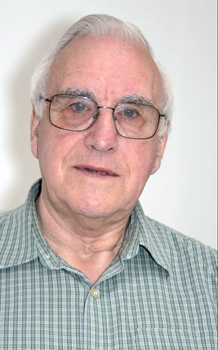Donald Stott
Former Regional Training Manager and printer,
Donald Stott, had his 7 year apprentice
compositor training interrupted by war-time
service. He began studying at the Regional College
of Art in Bradford in 1947 and gained his City and
Guilds Full Technological Certificate in 1955, when
he was named Student of the Year.
Donald had already completed the C&G Intermediate
Certificate in Halifax, but transferred to Bradford to
study for his Final and further certificates. “After nearly
60 sixty years I can still remember going up to the top
floor and looking at the mock shop fronts used to train
window dressers from Brown Muffs, Busby’s and other
retail organisations in the area.
 The Printing Department occupied a large room on
the ground floor. It was a very airy and well-lit room
equipped with composing frames and proofing
presses. On the basement level was the letterpress
and lithographic machine rooms each with its heavy
machines, the Monotype keyboards and casters and the
process engraving section with its large cameras and
etching baths. All the presentations and displays took
place in a large hall situated on the first floor directing
above the composing room and accessed by some
imposing stairs. I remember one occasion quite vividly
when for some obscure reason; overnight the gents’
toilet became the ladies and vice-versa, causing much
confusion, not to mention embarrassment to all who had
not read the notices! Printers’ costing and estimating
classes were located in some teaching classrooms in
houses in Grove Terrace.
The Printing Department occupied a large room on
the ground floor. It was a very airy and well-lit room
equipped with composing frames and proofing
presses. On the basement level was the letterpress
and lithographic machine rooms each with its heavy
machines, the Monotype keyboards and casters and the
process engraving section with its large cameras and
etching baths. All the presentations and displays took
place in a large hall situated on the first floor directing
above the composing room and accessed by some
imposing stairs. I remember one occasion quite vividly
when for some obscure reason; overnight the gents’
toilet became the ladies and vice-versa, causing much
confusion, not to mention embarrassment to all who had
not read the notices! Printers’ costing and estimating
classes were located in some teaching classrooms in
houses in Grove Terrace.
After 9 hours at work I had to
commute for classes running until 9pm, 3 nights per
week. Once a week we would adjourn to the Manville
Arms for some liquid refreshment and then dash into the
city centre to get a bus home - happy days!”
Donald spent 2 years in the RAF, doing a
correspondence course in machine printing while
serving in Egypt. After the war, he resumed work
at Dudley Hill and returned to College, his career
progressing in parallel. In 1954 he was poached by
Watmoughs, starting as an estimator and rising to
Group Training Officer, when challenges included
training all staff for metrication and decimalisation. In
1974 he became Training Advisor for the Printing &
Publishing Training Board, co-ordinating the training
of all apprentices in the North of England. Made
redundant in his 50s, he trained staff for 20 housing
associations in the North East Housing Association
Group for 10 years.
Retiring at 63 due to ill-health, he offered a printing
machine he kept in his cellar to Bradford Industrial
Museum. They wanted the machine – and Donald! He
has now been demonstrating the printing machines as
a volunteer for 8 years. “I have a lifetime of experience
in the printing industry and it is worthwhile to show,
particularly to school children, what computers have
replaced. As a printer you needed design, spelling and
punctuation and there was no room for costly errors.
We had a high standard of training.”
Photograph by Shelagh Ward